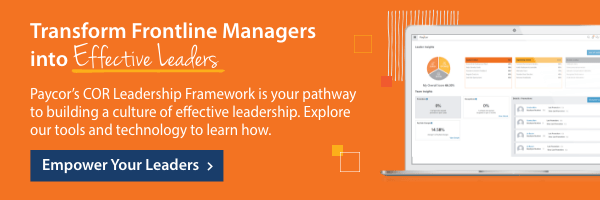As the competition for talent rages on, every business should be laser-focused on not just recruiting qualified employees but retaining their top performers. Here’s why:
- High performers are up to 400% more productive than other employees
- Top performing employees, usually only 5%, produce 26% of output.
- High performers typically provide up to 20% more effort than other employees.
What is a Top Performer?
Most of us know a high-producing employee when we see one. A top performer is an employee who consistently exceeds expectations. They possess a strong work ethic, a high level of competence, and are often self-motivated. Top performers exhibit strong problem-solving abilities, display a positive attitude and make a significant impact on the success of their organization. For obvious reasons, these are people you want to keep around. But keeping top performers happy is often easier said than done. A recent study found that 1 in 5 top performers were likely to leave their role in the next six months (Oxford).
If you’re curious about what it takes to retain top performers, here’s a hint: tired old retention tactics won’t work. Exceptional talent deserves exceptional care. Keep your workforce intact with these critical tips.
Make a Great First Impression with Onboarding
Engaging top performers starts with recruiting. The entire pre-hire process is an audition for your organization and for the potential employee. If the candidate experience doesn’t reflect a good employee experience, you may be in trouble. And, just because you’ve brought a new employee on board, the hiring process is not over. Providing an engaging onboarding experience is just as important as ensuring a smooth candidate experience during the hiring process. Onboarding is your first chance to engage with a new employee and a positive experience can go a long way to increasing retention. 91% of employees stay with a company for at least a year if they experienced a well-structured onboarding program (Learning Match). If onboarding is synonymous with paperwork at your organization, you may want to re-evaluate your 30-60-90-day process. You can start with our a free onboarding toolkit.
Optimize Your Benefits
These days, perks are the icing on the cake when you’re wooing applicants. A competitive benefits package is typically second only to salary when it comes to employee satisfaction. But a key factor to keep in mind is that a one-size-fits-all benefits program will likely backfire with five generations making up the workplace. A targeted benefits program is the way to go. Having the right benefits programs in place has been proven time and time again to improve engagement.

Offer Your Employees Flexible Schedules
When people have the chance to work flexibly, 87 percent of them take it (McKinsey). Do your employees have to be in the office for forty hours, five days a week? Many companies are now offering more flexible work arrangements and the results are telling. Forty six percent of companies that allow telecommuting say it has reduced attrition, and 95% of employers say it has positively impacted retention according to a Global Workplace Analytics study. No matter what option you choose, be sure to spell out the specifics in your your company handbook so there’s no ambiguity.
Recognize Your Employees’ Hard Work
Everyone likes to be appreciated and recognized for a job well done. But many employers struggle to effectively celebrate their people. Gallup’s annual study of the American workforce revealed that only 33% of U.S. employees have received recognition or praise for doing good work in the past seven days. And unfortunately, people who routinely feel that their best work is ignored are twice as likely to say they’ll quit in the next year, so it’s easy to see why it’s important to make employees feel appreciated. When employees feel valued, they’re more engaged, motivated, and likely to go the extra mile for their company. Fortunately, showing your employees appreciation doesn’t have to break the budget.
Invest in their Careers
Helping employees grow in their careers is no longer a nice to have, it’s a must. According to LinkedIn, more than 9 in 10 employees would stay at a company longer if their employer invested in their careers. Professional development doesn’t have to be limited to external training, either. Personalized training is a start but also consider executive coaching and or creating a mentorship program that pairs senior-level executives with high performers. The result is a pool of potential new leaders from within your company who are more likely to succeed than leaders brought in from outside the business.
Show Them the Big Picture
It pays to compete. Competitive compensation is directly tied to employee retention; and, a total compensation statement details all cash income, as well as the value of the benefits employees receive. It’s often referred to as a hidden paycheck because most employees only focus on their net pay and underestimate the value of the entire benefits package. The more you can promote the extra perks and help employees think beyond the dollars, the more they will value their entire compensation.
Make Communication a Priority
Lack of communication is often the main catalyst for employee frustrations. As workforce demographics have changed, so too have communication preferences. Though millennials desire more feedback from their managers, don’t neglect the rest of your workforce. Real-time, one-on-one coaching conversations can eliminate problems before they become issues. Also, make sure your business is providing opportunities for employee to give honest feedback. Surveys and employee resource groups, or ERGs are great places to start.
Promote from Within
It’s discouraging to your best employees if you continually recruit new management from outside the company. That’s why many companies are introducing succession planning as a key retention strategy. A sound succession plan can help develop top performers for future internal positions while showing employees they’re valued. But before you get started, remember that succession planning isn’t only for top leadership positions. It should apply to everyone within the organization.
Retain Your Top Performers
To keep top performers engaged, businesses must prioritize creating a positive first impression, tailoring benefits to meet employees’ unique needs, offering flexible work arrangements, providing recognition and career development opportunities, promoting open communication, and implementing succession planning. However, don’t phone it in, ensure you are creating an environment that works best for your specific set of unique employees.
How Paycor Can Help
Paycor specializes in helping businesses of all sizes retain top talent. Create a culture no one wants to leave with help from Paycor. Seamlessly keep top performers engaged with a suite of products that can help.
Onboarding: Automate administrative tasks prior to day one. Set new employees up for career success.
COR Leader Dashboard: View employee recognition, job status, and compensation data for help identifying which employees may need attention.
1:1 Tool: Get help managing regular feedback sessions for your workforce.
Discover how you can access the tools and technology you need to Coach, Optimize and Retain your best workers.










